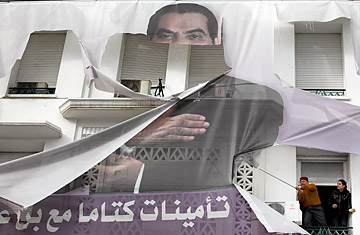
Two men try to remove a torn photo of former Tunisian President Zine El Abidine Ben Ali in the center of Tunis, Sunday, Jan. 16. 2011.
What are we to make of the tumult in Tunis? Few uprisings in recent memory have materialized as suddenly and produced results as swiftly as Tunisia's Jasmine Revolution. Just one month ago, former President Zine el-Abdine Ben Ali and his clan luxuriated in the kind of outrageous fortune that only two decades of U.S.-backed, kleptocratic rule can buy: beachfront villas, pet tigers, ice cream flown in from St. Tropez. Now they can't even keep their rooms at Euro Disney. The fall of such a corrupt and repressive dictator has set off celebrations among activists throughout the Middle East. Even the White House found itself cheering the ouster of a man it once considered a reliable ally. "Tunisia's future will be brighter," President Obama said, "if it is guided by the voices of its people."
Maybe. But the euphoria in Tunis has been short-lived. The forty-eight hours following Ben Ali's abdication were marked by riots, gun battles, prison breaks and not one, but two, changes of government. The collapse of authority has encouraged the country's security forces to settle scores on their own. It's possible Tunisia may eventually transform itself into a stable, representative democracy. But the country is likely in for a period of chronic upheaval and political strife — the conditions in which militants and strongmen thrive.
And so the Tunisian revolution should give us pause. For a time after 9/11, the U.S.'s foreign policy in the Middle East was guided by the "liberty agenda": a belief that implanting democracy in the Arab world would help combat Islamic radicalism. Historic, free elections have indeed come off in places like Iraq, Lebanon and the Palestinian territories — and yet radicalism remains. If anything, democracy has made anti-Western forces more assertive, not less, and exacerbated political tensions rather than resolving them. As a result, foreign-policy realists — including many in the Obama Administration — tend to treat events like the Tunisian revolt with caution. In their eyes, further democratization in the region could destabilize traditional U.S. allies, like Egypt and Saudi Arabia, at a time when Washington needs their help to root out al-Qaeda and contain a rising Iran.
And yet the velocity of the Tunisian revolution suggests that anti-establishment forces in the region may be stronger and more pervasive than many in the West had assumed. Ben-Ali's overthrow also shows that the support of the United States is no longer sufficient to protect Arab strongmen who lack popular legitimacy. Whether the U.S. likes it or not, Tunis-style clashes between young, restless Arab populations and their sclerotic, Western-backed leaders are bound to become more common.
So whose side should we be on? Perhaps the biggest mistake made by advocates of the liberty agenda was their claim that democratization would reduce the threat of terrorism. In fact, allowing people to vote in elections has little impact on whether or not they will become terrorists. The frustration that fuels militancy in the Arab world has less to do with politics than with the region's stagnant growth relative to the rest of the world — the result of outdated education systems, gender inequality and underinvestment in industries other than oil. Finding solutions to those problems is critical to the life prospects of tens of millions of Arabs. But doing so will be impossible so long as decision-making power remains in the hands of the same ruling clans who allowed their societies to fall so far behind in the first place.
The reasons for seeking freer and more democratic Arab societies have less to do with our future than with theirs. At this point, the U.S. can't openly stump for democracy in the Middle East. Our influence is at a low ebb. The wars in Iraq and Afghanistan and Washington's strong support for Israel have tarnished our image in the region. Among Arabs, the most admired world leaders are those who most consistently stand up to the U.S. and Israel. But simply because our name is mud doesn't mean democracy's must be too. Tunisia's revolutionaries, after all, didn't need our endorsement to throw off the yoke of despotism. The experience of the last decade has convinced Americans that we shouldn't be in the business of imposing democracy at the point of a gun. But it's never been in our interests to stand in the way of democracy either.
Lending moral support to activists in Tunis or Cairo or Riyadh won't on its own make the U.S. any more secure. But it would provide an opportunity for us to realign our policies with our ideals and, perhaps, earn some trust with a generation of Arabs yearning to seize control of their destinies. "I can't believe my eyes!" one Bahraini blogger tweeted about Tunisia. "An Arab nation woke up and said enough!!!" It's time that we did too.
Ratnesar, a TIME contributing editor-at-large, is a Schwartz Fellow at the New America Foundation and the author of Tear Down This Wall: A City, a President, and the Speech That Ended the Cold War. His column on global affairs appears every Monday on TIME.com.
